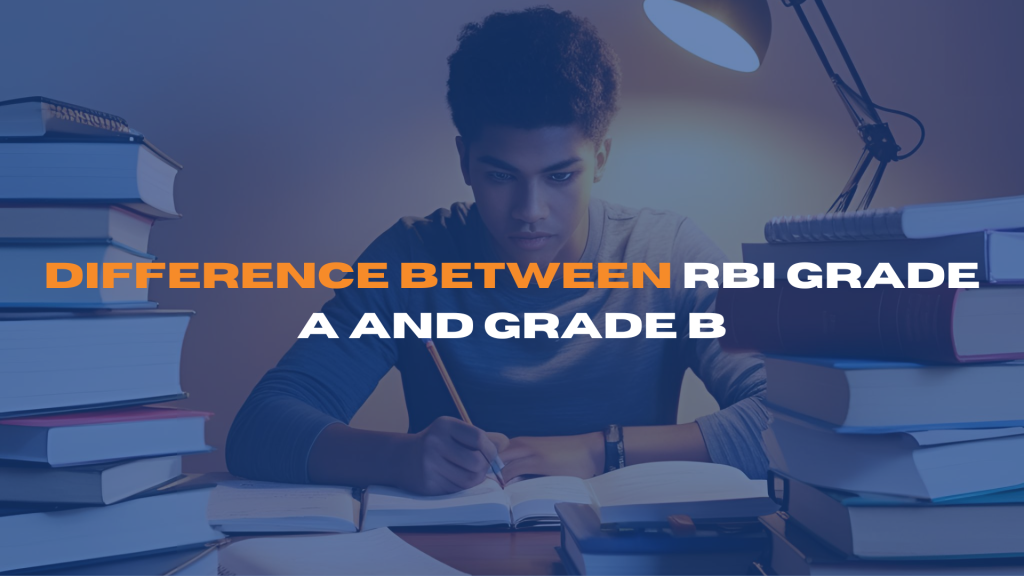The RBI plays an important role in the Indian economy, as the country’s central bank and the main regulator of the financial system. The key functions include maintenance of monetary stability, managing foreign exchange, and supervising the banking sector. For many hopeful applicants, a career in RBI symbolizes a prestige position through which they can work to create the country’s economic architecture.

There are many types of posts offered by RBI, and out of the various, the two most highly sought-after ones are Grade A and Grade B officers. Although both roles give satisfying careers, there are several things to understand between them and also in responsibilities, eligibility, and careers. Here is a list of key differences in RBI Grade A and Grade B exams to choose the best-suited career for yourself.
RBI Exams Overview
RBI Grade A
RBI Grade A officers are appointed on the Assistant Manager post. Officers in the RBI Grade A are not directly recruited through national exams. Employees from posts below the RBI Grade A usually are promoted to Assistant Managers.
Eligibility: Since only the eligibility criteria for the Security and Rajbhasha streams are released by RBI so far, we will take their lead to understand the RBI Grade A eligibility criteria. For the Security stream, the candidate should be an Officer with a minimum of five years’ of Commissioned Service in the Army/Navy/Air Force.
For the RBI Grade A Rajbhasha, educational qualifications of the last recruitment were:
Those who hold a Second Class Master’s Degree in one of the following fields shall be considered eligible:
Hindi or Hindi Translation with English at the Bachelor’s level;
English with Hindi at the Bachelor’s level; Sanskrit, Economics, or Commerce with English and Hindi both at the Bachelor’s level.
If the candidate has not been awarded a Bachelor’s degree with Hindi as one of the main subjects, then a qualification recognized as equivalent to a Bachelor’s degree in Hindi would be acceptable. Or the candidate must have passed at least a Master’s Degree both in English and Hindi or Hindi Translation, one being a Second Class degree.
The candidate should also be conversant with bi-lingual word processing to assist in their work.
Must be translation between English and Hindi/ and working for a glossary that could have at least three years, done in a national level weekly newspaper, government/ semi-government office or independent unit
Also, desirable qualifications involve educational qualification at the Bachelor level of Sanskrit, linguistic any modern Indian language. Has a literary work published at times also an advantage.
These requirements are made to ensure that candidates have academic background and practical skills for the role.
Age Limit: For grade A vacancies, the age range for the Security department is mentioned as being 25 and 40. There will be no age relaxation for candidates within this category. For the Rajbhasha stream under RBI Grade A, candidates must not be above the age of 30. However, in the case of candidates with a PhD, the maximum age limit will be set at 32 years.
RBI Grade B
On the other hand, officers of RBI Grade B perform more senior roles with greater authority and responsibility and are recruited at the post of Managers. They are entrusted with policymaking and management and perform managerial functions for the bank. They often head teams of projects that affect the greater macro-financial landscape of India.
Eligibility: The master’s degree in economics/finance/business administration is norm eligibility for RBI Grade B; professional qualifications such as CA or CS can add points to the candidate’s favor.
Age: The age is usually within 21-30 years for Grade B candidates as well, although candidates having relevant experience will have extended age limits depending upon their backgrounds.
Difference Between RBI Grade B and RBI Grade A
While applying to the Reserve Bank of India (RBI), it would be important for the aspirant applicants to understand the difference between RBI Grade B and Grade A. Below is a structured comparison based on several criteria:
Job Role and Responsibilities
RBI Grade B
RBI Grade A officers have specific responsibilities based on their stream, thereby the smooth working of Reserve Bank of India.
Security stream : The role of an officer in the Security stream mainly entails the supervision of internal security and safety arrangements of the Bank. It further includes the management of watch and ward operations, guarding the treasure vaults, as well as securing the entry and exit points within the office buildings of the Bank. Surveillance: Officers perform surveillance through the CCTV system, monitoring of activities, and keeping accurate records. In addition, officers perform protocol duties, take care of maintaining and securing properties belonging to the Bank, and monitor employees detailed for security purposes. This serves to secure the assets and operational integrity of the Bank.
Rajbhasha stream: Officers in this stream engage in propagating and implementing the use of Hindi in the Bank’s operations. Their tasks comprise translation of various references, documents, manuals, and publications from English to Hindi and vice versa along with making arrangements for their printing. They also undertake the task of implementing Government directives relating to use of Hindi in the organization. One of the other major responsibilities is administration of Hindi Teaching Scheme for the staff of the Bank to ensure its proficiency and adherence to official language policies.
RBI Grade A
In contrast, Grade A officers are mainly engaged in supporting roles, aiding in research and analysis of the policies and banking regulations. Their work is relatively simple, being based on data collection and preliminary analysis rather than the actual implementation of the policy.
Exam Pattern
RBI Grade B Exam Exam Pattern
The recruitment for RBI Grade B is done in three stages:
Stage I: Preliminary Exam (objective type).
Stage II: Mains Exam (has objective and descriptive sections).
Stage III: Interview.
This pattern shows a tough scrutiny of the candidate’s knowledge and analytical skills at different levels.
RBI Grade A Exam
The RBI Grade A exam pattern is not the same for each stream. For the RBI Grade A Security branch, only an Interview is conducted. For the Rajbhasha stream, a written test and interview are conducted. With the sure short release of RBI Grade A vacancies this year, the exam pattern is said to be unique.
Selection Process
RBI Grade B
RBI Grade B selection is more competitive because of the stakes involved in the job role. Candidates must clear all three phases of Preliminary, Mains, and Interview to get selected.
RBI Grade A
The process is not as competitive but still very rigorous. It is expected that the syllabus of the RBI Grade A and Grade B will be the same but the weightage of sections and conduct of different papers will vary.
Remuneration and Compensation
RBI Grade B Salary
The starting salaries of RBI Grade B officers are pretty high, around ₹55,200 per month along with other allowances, which takes the total gross salary to about ₹1,16,914 after adding all other benefits. Moreover, even the long-term growth regarding the finances will be excellent because of quicker promotion and increments.
RBI Grade A Salary
The RBI Grade A salary is lower than the starting grade of B officers, but the remuneration remains competitive within the banking industry. The salary received by RBI Grade A officers is only slightly less than that of RBI Grade B officers.
Career Growth Opportunities
Grade B Officers have a clearer way of higher managerial roles in the RBI hierarchy and may eventually even become Deputy Governor or Governor over time. This gives them substantial career advancement opportunities along with more responsibility.
Grade A Officers, although have opportunities for promotion, their career growth is generally slower compared to their Grade B colleagues as the role assigned to them initially is more supportive in nature.
Even though RBI Grade A and RBI Grade B positions are careers offering promising careers within India’s central banking system, they are dramatically different in terms of job roles, exam structure, eligibility criteria, selection processes, scales of pay, and prospects for career advancement.
Any aspiring candidate should weigh these differences appropriately as he or she will determine which path best matches their career aspirations and qualification levels.
Reasons to Consider When Choosing Between RBI Grade A and Grade B
Both RBI Grade A and Grade B positions are excellent career opportunities within the Reserve Bank of India, and each has its own advantages. The following are some key reasons to consider when deciding between the two:
Career Aspirations
RBI Grade A officers can work as Assistant Managers with more supportive assignments such as research and analysis concerning the policies of banking. Here, RBI Grade B is much more related to managerial duties by authority with policymaking experience and heading teams. Depending upon whether you like supporting kinds of work, then RBI Grade A is apt but if you like to take and hold some positions for implementing strategy then Grade B can meet your requirement.
Academic Background
Eligibility criteria vary greatly between the two grades. RBI Grade A generally requires candidates to hold a Master’s degree in particular streams like Hindi or English for the Rajbhasha stream or experience relevant to the field for the Security stream. In contrast, RBI Grade B demands a Master’s degree in economics, finance, or business administration. The analysis of your qualifications would reveal which post you are eligible for.
The two grades also have maximum limits over one’s age. While an applicant cannot exceed the maximum limit over RBI grade A when an age of 30 with, at a stretch 32 in the case of post-hold, PHD candidates exists; this for RBI Grade B remains 21 -30 with extended possibility as based upon past work experience. Age nearer or touching any of the cutoff can prove a limiting choice here.
Job Responsibilities
RBI Grade A is apt for people who enjoy the activities of research, analysis, and support functions of any organization. If you want to work on data collection and helping in the implementation of policy, Grade A might suit you.
RBI Grade B: If you are interested in leadership roles and wish to have discussions at high levels of monetary policy, regulation of the banking system, and soundness of the financial system, Grade B will usher you into all of it.
Working Conditions
The selection process for RBI Grade B is more competitive because of higher stakes and responsibilities. Candidates must clear three stages: Preliminary Exam, Mains Exam, and Interview. In contrast, RBI Grade A usually depends on the stream, say an interview for Security. You may prefer a less competitive environment, and Grade A might be more appealing.
Salary Expectations
Salaries also vary between the two. RBI Grade B officers have higher starting salaries, around ₹55,200 per month, while Grade A officers get slightly lower compensation but still competitive in the banking sector. Your financial goals should be considered when making this choice.
Conclusion
In short, both RBI Grade A and Grade B are excellent choices based on your career goals and personal preferences. Whether it is early entry into the banking industry with foundational experience or working toward higher managerial roles with important responsibilities, both provide opportunities and contribute to a rewarding career in the Reserve Bank of India. With careful analysis of your qualifications, aspirations, and work preferences, you can make an informed choice that will help you get started on the right path in line with your career ambitions.
ixamBee specializes in providing expert guidance and resources for banking exams 2024, ensuring that you are well-prepared for the Upcoming Bank Exams like RBI Grade B, NABARD Grade B, IBPS SO, and more. Our courses align with the bank exam calendar 2024, covering all the essential topics. With a focus on the upcoming bank jobs, our Previous Year Papers, BeePedia, SSC CGL, SSC CHSL, SSC MTS and other Mock Tests are designed to help you excel in upcoming banking exams.














